Piano Sheet Music
 "Music is everybody's possession. It's only publishers who think that people own it." John Lennon
"Music is everybody's possession. It's only publishers who think that people own it." John Lennon
Vandread

Vandread is a Japanese anime series directed by Takeshi Mori and created by the animation studios Gonzo and Media Factory. The series is composed of two seasons, each composed of thirteen episodes of twenty-five minutes.
Chris Sligh

Charles Christopher Sligh is an American singer, songwriter, producer and pastor who was a finalist on the sixth season of American Idol, finishing in tenth place. He has released 14 albums since 2001 as a solo artist, with his band Half Past Forever or with his former church's musical entity, Shoreline Music.
Ryuichi Sakamoto
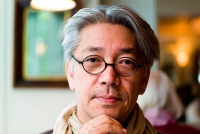
Ryuichi Sakamoto (坂本 龍一 Sakamoto Ryūichi?, born January 17, 1952) is an Academy Award-, Grammy-, and Golden Globe-winning Japanese musician, composer, record producer and actor, based in New York and Tokyo. He played keyboards in the influential Japanese electropop band Yellow Magic Orchestra. His 1999 musical composition "Energy Flow" is the first number-one instrumental single in the Japan's Oricon charts history. He was ranked at number 59 in a list of the top 100 most influential musicians compiled by HMV Japan.
Mozart

Wolfgang Amadeus Mozart, full name Johann Chrysostom Wolfgang Amadeus Mozart (27 January 1756 â 5 December 1791) was a prolific and influential composer of the Classical era. His over 600 compositions include works widely acknowledged as pinnacles of symphonic, concertante, chamber, piano, operatic, and choral music. Mozart is among the most enduringly popular of classical composers, and many of his works are part of the standard concert repertoire.
Mozart's music, like Haydn's, stands as an archetypal example of the Classical style. His works spanned the period during which that style transformed from one exemplified by the style galant to one that began to incorporate some of the contrapuntal complexities of the late Baroque, complexities against which the galant style had been a reaction. Mozart's own stylistic development closely paralleled the development of the classical style as a whole. In addition, he was a versatile composer and wrote in almost every major genre, including symphony, opera, the solo concerto, chamber music including string quartet and string quintet, and the piano sonata. While none of these genres were new, the piano concerto was almost single-handedly developed and popularized by Mozart. He also wrote a great deal of religious music, including masses; and he composed many dances, divertimenti, serenades, and other forms of light entertainment.
The central traits of the classical style can be identified in Mozart's music. Clarity, balance, and transparency are hallmarks of his work.
Mozart's music, like Haydn's, stands as an archetypal example of the Classical style. His works spanned the period during which that style transformed from one exemplified by the style galant to one that began to incorporate some of the contrapuntal complexities of the late Baroque, complexities against which the galant style had been a reaction. Mozart's own stylistic development closely paralleled the development of the classical style as a whole. In addition, he was a versatile composer and wrote in almost every major genre, including symphony, opera, the solo concerto, chamber music including string quartet and string quintet, and the piano sonata. While none of these genres were new, the piano concerto was almost single-handedly developed and popularized by Mozart. He also wrote a great deal of religious music, including masses; and he composed many dances, divertimenti, serenades, and other forms of light entertainment.
The central traits of the classical style can be identified in Mozart's music. Clarity, balance, and transparency are hallmarks of his work.
Diana Krall
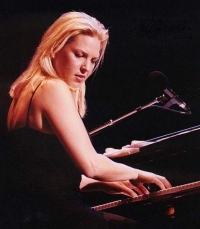
Diana Jean Krall, (born November 16, 1964) is a Canadian jazz pianist and singer.
Krall was born into a musical family in Nanaimo, British Columbia, Canada. She began learning the piano at the age of four. In high school, she started playing in a small jazz group. When she was 15 she started playing regularly in several Nanaimo restaurants.
At age seventeen she won a scholarship from the Vancouver International Jazz Festival to study at the Berklee College of Music in Boston, and completed three terms.
In Nanaimo her playing attracted the attention of famed bass player Ray Brown (ex-husband of the late Ella Fitzgerald, long-time member of the Oscar Peterson Trio and Grammy-winning composer) and drummer Jeff Hamilton. After hearing her play, Brown and Hamilton persuaded Krall to move to Los Angeles, and study with pianist Jimmy Rowles, with whom she began to sing. This also brought her into contact with influential teachers and producers. In 1990, Krall relocated to New York.
Krall was born into a musical family in Nanaimo, British Columbia, Canada. She began learning the piano at the age of four. In high school, she started playing in a small jazz group. When she was 15 she started playing regularly in several Nanaimo restaurants.
At age seventeen she won a scholarship from the Vancouver International Jazz Festival to study at the Berklee College of Music in Boston, and completed three terms.
In Nanaimo her playing attracted the attention of famed bass player Ray Brown (ex-husband of the late Ella Fitzgerald, long-time member of the Oscar Peterson Trio and Grammy-winning composer) and drummer Jeff Hamilton. After hearing her play, Brown and Hamilton persuaded Krall to move to Los Angeles, and study with pianist Jimmy Rowles, with whom she began to sing. This also brought her into contact with influential teachers and producers. In 1990, Krall relocated to New York.
Shirley Temple
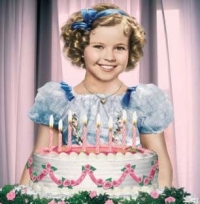
Shirley Temple (born April 23, 1928) is an American actress and public servant. The daughter of George and Gertrude Temple, she began her screen career in 1932 at the age of three with comedy shorts and bit parts in feature films. Following her breakthrough film Stand Up and Cheer! in 1934, she skyrocketed to superstardom the same year with the Christmas release of Bright Eyes, a feature film designed specifically for her talents. Star status was confirmed with an Academy Award in February 1935, and blockbusting super hits such as Curly Top and Heidi followed year after year during the mid to late 1930s. Licensed merchandise that included dolls, dishes, and clothing capitalized on her image.She is the youngest person ever to be awarded an Oscar (age 6), she was awarded the inaugural (now retired) non-competitive Academy Juvenile Award in 1934. Temple's popularity waned in her teens and she left Twentieth Century-Fox at the age of twelve to attend high school. She appeared in a few films of varying quality in her mid to late teens, and retired completely from the silver screen in 1950 at the age of twenty-one. She starred in twenty-four films for Twentieth Century-Fox, and was the top box-office draw four years in a row (1935–1938) in a Motion Picture Herald poll.
Temple's parents were powerful forces in their daughter's rise to stardom and success. Gertrude Temple enrolled her daughter in dance school, doggedly made the rounds of casting offices, read scripts to her daughter, crafted her emotional, physical, and vocal expressions, monitored her daughter's performance from a chair placed beside the camera, conducted her own interviews, and received a paid position at Twentieth Century-Fox as Temple's coach and hairdresser. Temple's father was a bank employee who managed his daughter's wealth through astute investments. In 1945, against her parents' better judgment, seventeen-year-old Temple married Army Air Force sergeant John Agar, who, after being discharged from the service, entered the acting profession. The couple made two films together before Temple divorced him on the grounds of mental cruelty in 1949, receiving custody of their daughter Linda Susan and the restoration of her maiden name in the process. In January 1950, Temple met the conservative scion of a patrician California family and United States Navy Silver Star recipient Charles Alden Black. She married him in December 1950 following the finalization of her divorce and retired from films the same day to become a homemaker. Charles Alden Black, Jr. was born in 1952 and Lori Alden Black in 1954. In 1972, Shirley Temple Black was one of the first prominent women to speak openly about breast cancer after undergoing a modified radical mastectomy.
In 1958, Temple returned to show biz with Shirley Temple's Storybook, a live-action television anthology series featuring fairy tale adaptations. Temple played hostess and narrated or acted in episodes. Stars Charlton Heston, Claire Bloom, Elsa Lanchester, Rod McKuen, Joel Grey and others appeared on the show. The series chalked up a single season, left the air for a season, and returned for its final season in color in 1960 as The Shirley Temple Show. The reprise included adaptations of material other than fairy tales such as Ludwig Bemelmans's Madeline, and Nathaniel Hawthorne's The House of the Seven Gables. Temple made guest appearances on various television shows in the early 1960s and filmed a sitcom pilot that was never released. Temple sat on the boards of many corporations and organizations including The Walt Disney Company, Del Monte Foods, and the National Wildlife Federation. In the mid 1960s, she entered public life, ran unsuccessfully for United States Congress in 1967, and received appointments as United States Ambassador to Ghana in 1974 and to Czechoslovakia in 1989. In 1988, she published her autobiography, Child Star. Temple has received many awards and honors over her lifetime including Kennedy Center Honors and a Screen Actors Guild Life Achievement Award.
Temple's parents were powerful forces in their daughter's rise to stardom and success. Gertrude Temple enrolled her daughter in dance school, doggedly made the rounds of casting offices, read scripts to her daughter, crafted her emotional, physical, and vocal expressions, monitored her daughter's performance from a chair placed beside the camera, conducted her own interviews, and received a paid position at Twentieth Century-Fox as Temple's coach and hairdresser. Temple's father was a bank employee who managed his daughter's wealth through astute investments. In 1945, against her parents' better judgment, seventeen-year-old Temple married Army Air Force sergeant John Agar, who, after being discharged from the service, entered the acting profession. The couple made two films together before Temple divorced him on the grounds of mental cruelty in 1949, receiving custody of their daughter Linda Susan and the restoration of her maiden name in the process. In January 1950, Temple met the conservative scion of a patrician California family and United States Navy Silver Star recipient Charles Alden Black. She married him in December 1950 following the finalization of her divorce and retired from films the same day to become a homemaker. Charles Alden Black, Jr. was born in 1952 and Lori Alden Black in 1954. In 1972, Shirley Temple Black was one of the first prominent women to speak openly about breast cancer after undergoing a modified radical mastectomy.
In 1958, Temple returned to show biz with Shirley Temple's Storybook, a live-action television anthology series featuring fairy tale adaptations. Temple played hostess and narrated or acted in episodes. Stars Charlton Heston, Claire Bloom, Elsa Lanchester, Rod McKuen, Joel Grey and others appeared on the show. The series chalked up a single season, left the air for a season, and returned for its final season in color in 1960 as The Shirley Temple Show. The reprise included adaptations of material other than fairy tales such as Ludwig Bemelmans's Madeline, and Nathaniel Hawthorne's The House of the Seven Gables. Temple made guest appearances on various television shows in the early 1960s and filmed a sitcom pilot that was never released. Temple sat on the boards of many corporations and organizations including The Walt Disney Company, Del Monte Foods, and the National Wildlife Federation. In the mid 1960s, she entered public life, ran unsuccessfully for United States Congress in 1967, and received appointments as United States Ambassador to Ghana in 1974 and to Czechoslovakia in 1989. In 1988, she published her autobiography, Child Star. Temple has received many awards and honors over her lifetime including Kennedy Center Honors and a Screen Actors Guild Life Achievement Award.
Philip Glass
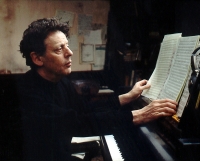
Philip Glass (born January 31, 1937) is a three-time Academy Award-nominated American classical music composer. He is considered one of the most influential composers of the late-20th century and is widely acknowledged as a composer who has brought art music to the American public (along with precursors such as Richard Strauss, Kurt Weill and Leonard Bernstein).
His music is described as minimalist, from which he distanced himself in being a composer of "music with repetitive structures". Although his early, mature music is minimalist, he has evolved stylistically. Currently, he describes himself as a "Classicist", trained in harmony and counterpoint and studied Johann Sebastian Bach, Ludwig van Beethoven, and Franz Schubert.
Glass is a prolific composer: he has written ensemble works, operas, eight symphonies, eight concertos, film scores, and solo works. Glass counts many visual artists, writers, musicians, and directors among his friends, including Richard Serra, Chuck Close, Doris Lessing, Allen Ginsberg, Errol Morris, Robert Wilson, JoAnne Akalaitis, John Moran, actors Bill Treacher and Peter Dean, Godfrey Reggio, Ravi Shankar, Linda Ronstadt, Paul Simon, David Bowie, Patti Smith, the conductor Dennis Russell Davies, and electronic musician Aphex Twin, who have all collaborated with him. Among recent collaborators are Glass's fellow New Yorkers Leonard Cohen, and Woody Allen. He composed an opera for the opening of Expo '98.
His music is described as minimalist, from which he distanced himself in being a composer of "music with repetitive structures". Although his early, mature music is minimalist, he has evolved stylistically. Currently, he describes himself as a "Classicist", trained in harmony and counterpoint and studied Johann Sebastian Bach, Ludwig van Beethoven, and Franz Schubert.
Glass is a prolific composer: he has written ensemble works, operas, eight symphonies, eight concertos, film scores, and solo works. Glass counts many visual artists, writers, musicians, and directors among his friends, including Richard Serra, Chuck Close, Doris Lessing, Allen Ginsberg, Errol Morris, Robert Wilson, JoAnne Akalaitis, John Moran, actors Bill Treacher and Peter Dean, Godfrey Reggio, Ravi Shankar, Linda Ronstadt, Paul Simon, David Bowie, Patti Smith, the conductor Dennis Russell Davies, and electronic musician Aphex Twin, who have all collaborated with him. Among recent collaborators are Glass's fellow New Yorkers Leonard Cohen, and Woody Allen. He composed an opera for the opening of Expo '98.
Saint Saens

Charles-Camille Saint-Saëns (9 October 1835 – 16 December 1921) was a French composer, organist, conductor, and pianist, known especially for The Carnival of the Animals, Danse Macabre, Samson and Delilah, Havanaise, Introduction and Rondo capriccioso, and his Symphony No. 3 (Organ Symphony).
Harold Arlen
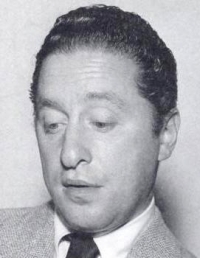
Harold Arlen (February 15, 1905 – April 23, 1986) was an American composer of popular music. Having written over 500 songs, a number of which have become known the world over. In addition to being the composer of The Wizard of Oz, Arlen is a highly regarded contributor to the Great American Songbook. His 1938 song "Over the Rainbow” was voted the twentieth century's No. 1 song by the Recording Industry Association of America (RIAA) and the National Endowment for the Arts (NEA).
lThe Lion King

As a cub, Simba is forced to leave the Pride Lands after his father Mufasa is murdered by his wicked uncle, Scar. Years later, he returns as a young lion to reclaim his throne.
Traditional

D Spencer Magnum
The text of this hymn is set to the music "Divinity" by American composer ... Whenever I label CD's, I just label it "Hymn Arrangements by Spencer Mangum".
Chopin

Frédéric Chopin (1 March 1810 – 17 October 1849) was a Polish composer and virtuoso pianist of the Romantic period. He is widely regarded as the greatest Polish composer, and ranks as one of music's greatest tone poets.
He was born in the village of Żelazowa Wola, in the Duchy of Warsaw, to a Polish mother and French-expatriate father, and in his early life was regarded as a child-prodigy pianist. In November 1830, at the age of 20, Chopin went abroad; following the suppression of the Polish November Uprising of 1830–31, he became one of many expatriates of the Polish "Great Emigration."
In Paris, he made a comfortable living as a composer and piano teacher, while giving few public performances. A Polish patriot,
Chopin's extant compositions were written primarily for the piano as a solo instrument. Though technically demanding, Chopin's style emphasizes nuance and expressive depth rather than virtuosity. Chopin invented musical forms such as the ballade and was responsible for major innovations in forms such as the piano sonata, waltz, nocturne, étude, impromptu and prelude. His works are mainstays of Romanticism in 19th-century classical music.
He was born in the village of Żelazowa Wola, in the Duchy of Warsaw, to a Polish mother and French-expatriate father, and in his early life was regarded as a child-prodigy pianist. In November 1830, at the age of 20, Chopin went abroad; following the suppression of the Polish November Uprising of 1830–31, he became one of many expatriates of the Polish "Great Emigration."
In Paris, he made a comfortable living as a composer and piano teacher, while giving few public performances. A Polish patriot,
Chopin's extant compositions were written primarily for the piano as a solo instrument. Though technically demanding, Chopin's style emphasizes nuance and expressive depth rather than virtuosity. Chopin invented musical forms such as the ballade and was responsible for major innovations in forms such as the piano sonata, waltz, nocturne, étude, impromptu and prelude. His works are mainstays of Romanticism in 19th-century classical music.
Into the Woods
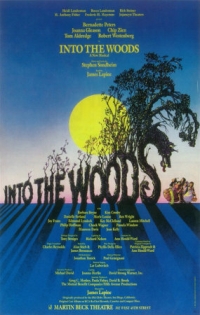
Into the Woods is an award-winning musical with music and lyrics by Stephen Sondheim and book by James Lapine. It debuted in San Diego at the Old Globe Theatre in 1986, and premiered on Broadway in 1987. Bernadette Peters' performance as the Witch, and Joanna Gleason's portrayal of the Baker's Wife, brought acclaim to the production during its original Broadway run. Into the Woods won several Tony Awards, including Best Score, Best Book, and Best Actress in a Musical (Joanna Gleason), in a year dominated by The Phantom of the Opera. The musical has been produced many times, with a 1988 national tour, a 1990 West End production, a 1991 television production, a 1997 tenth anniversary concert, a 2002 Los Angeles production and a 2002 Broadway revival.
Inspired by Bruno Bettelheim's 1976 book, The Uses of Enchantment, the musical intertwines the plots of several Brothers Grimm fairy tales and follows them further to explore the consequences of the characters' wishes and quests. The main characters are taken from the stories of Little Red Riding Hood, Jack and the Beanstalk, Rapunzel, and Cinderella, tied together by a more original story involving a Baker and his wife and their quest to begin a family, most likely taken from the original story of Rapunzel by the Brothers Grimm. It also includes references to several other well-known tales.
Inspired by Bruno Bettelheim's 1976 book, The Uses of Enchantment, the musical intertwines the plots of several Brothers Grimm fairy tales and follows them further to explore the consequences of the characters' wishes and quests. The main characters are taken from the stories of Little Red Riding Hood, Jack and the Beanstalk, Rapunzel, and Cinderella, tied together by a more original story involving a Baker and his wife and their quest to begin a family, most likely taken from the original story of Rapunzel by the Brothers Grimm. It also includes references to several other well-known tales.
David Gray

David Gray (born June 13, 1968 in Sale, Greater Manchester) is a British singer-songwriter. Although he released his first studio album in 1993, he didn't receive worldwide attention until the release of White Ladder six years later. It was the first of three UK chart-toppers in six years for Gray, the latter two of which also made the Top 20 in the US.
Lefevre

Jean-Xavier Lefèvre (Lausanne Cressis, March 6, 1763 – Paris Neuilly, 1829 November 9) was a Swiss-born French clarinettist.Jean-Xavier LefèvreIn 1778, at the age of 15, Lefèvre became a member of the French Guards band. When the National Guard was formed in the year of the Revolution he played in this and from 1790 was its deputy conductor. In 1814 he was made a Chevalier of the Legion of Honor. He had many famous pupils at the Paris Conservatoire who included Janssen 1795/6, Péchignier 1797, Crusell 1803, Buteux 1814 to 1819, Crépin 1816 to 1821, Adolphe Hugot 1817 to 1822 and Pierre Hugot 1820 to 1824. He may also have taught Dacosta in 1797 and 1798, but some authorities say Duvernoy did.
Manuel Saumell

Manuel Saumell Robredo (19 April 1818 – 14 August 1870), was a Cuban composer known for his invention and development of genuinely creolized forms of music. For this reason he gets the credit for being the first to cultivate Cuban musical nationalism, and is of similar standing to Glinka who initiated Russian musical nationalism with A Life for the Tsar at about the same time.
Michael O'Brien
Michael David O'Brien is an American Christian musician and worship leader, who primarily plays Christian pop and contemporary worship music. He has released eight solo albums, since 1990. He was a touring member of the Heritage Singers, before becoming a full-fledged member of NewSong, in 1999.
Zé Ramalho

Zé Ramalho is a Brazilian composer and performer. Zé Ramalho has collaborated with various major Brazilian musicians, including Vanusa, Geraldo Azevedo and Alceu Valença to name a few. Zé Ramalho is also the first cousin of Elba Ramalho, a well known Brazilian composer and performer.
André van Haren

André van Haren Musical artist Genre: Classical Record label: André Van Haren Albums: Moments for piano solo
Songs After work late at night Moments for piano solo · 2020 The lost child Moments for piano solo · 2020 A Winter Tale
Moments for piano solo · 2020.
Songs After work late at night Moments for piano solo · 2020 The lost child Moments for piano solo · 2020 A Winter Tale
Moments for piano solo · 2020.
Regina Spektor

Regina Spektor (born February 18, 1980) is a Soviet-born Jewish-American singer-songwriter and pianist. Her music is associated with the anti-folk scene centered on New York City's East Village.
Spektor has said that she has created 700 songs, but that she rarely writes any of them down. She has also stated that she never aspired to write songs herself, but songs seem to just flow to her. Spektor possesses a broad vocal range and uses the full extent of it. She also explores a variety of different and somewhat unorthodox vocal techniques, such as verses composed entirely of buzzing noises made with the lips and beatbox-style flourishes in the middle of ballads, and also makes use of such unusual musical techniques as using a drum stick to tap rhythms on the body of the piano or chair.
Her lyrics are equally eclectic, often taking the form of abstract narratives or first-person character studies, similar to short stories or vignettes put to song. Spektor usually sings in English, though she sometimes includes a few words or verses of Latin, Russian, French, and other languages in her songs.
Spektor has said that she has created 700 songs, but that she rarely writes any of them down. She has also stated that she never aspired to write songs herself, but songs seem to just flow to her. Spektor possesses a broad vocal range and uses the full extent of it. She also explores a variety of different and somewhat unorthodox vocal techniques, such as verses composed entirely of buzzing noises made with the lips and beatbox-style flourishes in the middle of ballads, and also makes use of such unusual musical techniques as using a drum stick to tap rhythms on the body of the piano or chair.
Her lyrics are equally eclectic, often taking the form of abstract narratives or first-person character studies, similar to short stories or vignettes put to song. Spektor usually sings in English, though she sometimes includes a few words or verses of Latin, Russian, French, and other languages in her songs.
No Doubt
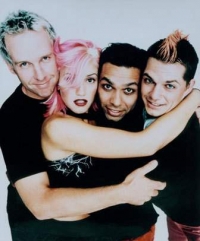
No Doubt is a rock band from Anaheim, California, United States, founded in 1986. The ska-rock sound of its first album failed to make waves due to the popularity of the grunge movement at the time. The band's diamond-certified album Tragic Kingdom helped to launch the ska revival of the 1990s, and "Don't Speak", the third single from the album, set a record when it spent sixteen weeks at the number one spot on the Billboard Hot 100 Airplay chart, later broken by the Goo Goo Dolls' "Iris".
The group released its next album, Return of Saturn, four years later, but despite positive reviews, the album was considered a commercial failure. Fifteen months later, the band reappeared with Rock Steady, which incorporated reggae and dancehall music into their work. The album was primarily recorded in Jamaica and featured collaborations with Jamaican artists Bounty Killer, Sly and Robbie, and Lady Saw. The album produced two Grammy-winning singles, "Hey Baby" and "Underneath It All".
No Doubt released the compilation The Singles 1992-2003 and box set Boom Box in 2003, both of which contained a cover version of the Talk Talk synthpop song "It's My Life". Frontwoman Gwen Stefani launched her solo career the next year with several collaborations, including bandmate Tony Kanal and Neptune Pharrell, while guitarist Tom Dumont began his side project, Invincible Overlord. During its career, the band has won two Grammy Awards and sold 27 million records worldwide to date.
The group released its next album, Return of Saturn, four years later, but despite positive reviews, the album was considered a commercial failure. Fifteen months later, the band reappeared with Rock Steady, which incorporated reggae and dancehall music into their work. The album was primarily recorded in Jamaica and featured collaborations with Jamaican artists Bounty Killer, Sly and Robbie, and Lady Saw. The album produced two Grammy-winning singles, "Hey Baby" and "Underneath It All".
No Doubt released the compilation The Singles 1992-2003 and box set Boom Box in 2003, both of which contained a cover version of the Talk Talk synthpop song "It's My Life". Frontwoman Gwen Stefani launched her solo career the next year with several collaborations, including bandmate Tony Kanal and Neptune Pharrell, while guitarist Tom Dumont began his side project, Invincible Overlord. During its career, the band has won two Grammy Awards and sold 27 million records worldwide to date.
Bart Howard

Bart Howard (born Howard Joseph Gustafson; June 1, 1915 — February 21, 2004) was the composer and writer of the famous jazz standard "Fly Me To The Moon", which has been performed by singers (among others) Frank Sinatra, Ella Fitzgerald, Nancy Wilson, Della Reese, Diana Krall, June Christy and Astrud Gilberto. It is also played frequently by jazz and popular musicians around the world.
Howard was born in Burlington, Iowa. He began his career as an accompanist at the age of 16 and played for Mabel Mercer, Johnny Mathis and Eartha Kitt, among others.
"Fly Me To the Moon" was first sung in 1954 by Felicia Sanders at the "Blue Angel" club in Manhattan where the composer became M.C. and accompanist in 1951. The song received wide exposure when Peggy Lee sang it on The Ed Sullivan Show several years later. Bart Howard "lived off" this song for the rest of his life, although he had 49 other songs to his credit.
He died, aged 88, in Carmel, New York. He was survived by a sister Dorothy Lind of Burlington, Iowa and by his companion of 58 years, Thomas Fowler.
Howard was born in Burlington, Iowa. He began his career as an accompanist at the age of 16 and played for Mabel Mercer, Johnny Mathis and Eartha Kitt, among others.
"Fly Me To the Moon" was first sung in 1954 by Felicia Sanders at the "Blue Angel" club in Manhattan where the composer became M.C. and accompanist in 1951. The song received wide exposure when Peggy Lee sang it on The Ed Sullivan Show several years later. Bart Howard "lived off" this song for the rest of his life, although he had 49 other songs to his credit.
He died, aged 88, in Carmel, New York. He was survived by a sister Dorothy Lind of Burlington, Iowa and by his companion of 58 years, Thomas Fowler.
Motoi Sakuraba
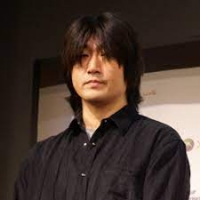
Motoi Sakuraba (桜庭 統, Sakuraba Motoi, born August 5, 1965) is a Japanese composer and keyboardist known for his numerous musical contributions in video games, anime series, television dramas, and progressive rock albums. Some of his notable works include the Tales, Star Ocean, Mario Golf, Mario Tennis, Golden Sun, and Dark Souls series.Sakuraba was born in Akita Prefecture, Japan. While attending Meiji University, Sakuraba began to take music composition seriously, and eventually formed the progressive rock band "Clashed Ice" in 1984, consisting of him on keyboards and Genta Kudo on drums and vocals.
Handel

George Frideric Handel (Friday, 23 February 1685 - Saturday, 14 April 1759) was a German-born Baroque composer who is famous for his operas, oratorios and concerti grossi. Born as Georg Friedrich Handel in Halle, he spent most of his adult life in England, becoming a subject of the British crown on 22 January 1727. His most famous works are Messiah, an oratorio set to texts from the King James Bible; Water Music; and Music for the Royal Fireworks. Strongly influenced by the techniques of the great composers of the Italian Baroque and the English composer Henry Purcell, his music was known to many significant composers who came after him, including Haydn, Mozart, and Beethoven.
Handel's compositions include 42 operas; 29 oratorios; more than 120 cantatas, trios and duets; numerous arias; chamber music; a large number of ecumenical pieces; odes and serenatas; and sixteen organ concerti. His most famous work, the Messiah oratorio with its "Hallelujah" chorus, is among the most popular works in choral music and has become a centerpiece of the Christmas season. Also popular are the Opus 3 and 6 Concerti Grossi, as well as "The Cuckoo and the Nightingale", in which birds are heard calling during passages played in different keys representing the vocal ranges of two birds. Also notable are his sixteen keyboard suites, especially The Harmonious Blacksmith.
Handel introduced various previously uncommon musical instruments in his works: the viola d'amore and violetta marina (Orlando), the lute (Ode for St. Cecilia's Day), three trombones (Saul), clarinets or small high cornets (Tamerlano), theorbo, French horn (Water Music), lyrichord, double bassoon, viola da gamba, bell chimes, positive organ, and harp (Giulio Cesare, Alexander's Feast).
Handel's compositions include 42 operas; 29 oratorios; more than 120 cantatas, trios and duets; numerous arias; chamber music; a large number of ecumenical pieces; odes and serenatas; and sixteen organ concerti. His most famous work, the Messiah oratorio with its "Hallelujah" chorus, is among the most popular works in choral music and has become a centerpiece of the Christmas season. Also popular are the Opus 3 and 6 Concerti Grossi, as well as "The Cuckoo and the Nightingale", in which birds are heard calling during passages played in different keys representing the vocal ranges of two birds. Also notable are his sixteen keyboard suites, especially The Harmonious Blacksmith.
Handel introduced various previously uncommon musical instruments in his works: the viola d'amore and violetta marina (Orlando), the lute (Ode for St. Cecilia's Day), three trombones (Saul), clarinets or small high cornets (Tamerlano), theorbo, French horn (Water Music), lyrichord, double bassoon, viola da gamba, bell chimes, positive organ, and harp (Giulio Cesare, Alexander's Feast).
David Sides

Growing up in a musical family, David began teaching himself how to play the piano at the age of 10, after being inspired by The Lion King motion picture soundtrack. His obsession with the film and its music motivated him to work through his struggles of learning how to play his favorite songs, all by ear. Over time his ability to play by ear drastically improved as he put his ear to the test every Sunday while playing at church, and as he challenged himself to learn anything he'd hear on the radio.After High School, David enrolled at the University of California, Riverside as a Math major. It wasn't until his Junior year that he decided to switch to Music in hopes of one day earning a living while doing something he loved. It was during this time that he began entering in school talent shows and competitions, two of which he won. Just before finishing college he was encouraged by his friends to begin uploading videos of himself playing his piano covers on a new and slowly growing website: YouTube.
Rupert Holmes

Rupert Holmes (born February 24, 1947) is an American-British composer, singer-songwriter, musician and author of plays, novels and stories. He is best known for his number one pop hit "Escape" (subtitled "The Piña Colada Song") in 1979, his Tony Award winning musical Drood (originally The Mystery of Edwin Drood) and his more recent Broadway musical Curtains.
Rupert Holmes made his professional debut as a playwright with the musical The Mystery of Edwin Drood, later known as Drood, in 1985. Holmes was encouraged to write a musical by Joseph Papp and his wife after they attended one of Holmes's cabarets in 1983. The result, loosely based on the Charles Dickens unfinished novel, and inspired by Holmes's memories of English pantomime shows he attended as a child, would earn Holmes Tony Awards for both book and score, as well as Drama Desk Awards (for book, music, and lyrics), and various other honors. Holmes also orchestrated Drood himself, making him one of the few Broadway composers to write his own orchestrations.
Rupert Holmes made his professional debut as a playwright with the musical The Mystery of Edwin Drood, later known as Drood, in 1985. Holmes was encouraged to write a musical by Joseph Papp and his wife after they attended one of Holmes's cabarets in 1983. The result, loosely based on the Charles Dickens unfinished novel, and inspired by Holmes's memories of English pantomime shows he attended as a child, would earn Holmes Tony Awards for both book and score, as well as Drama Desk Awards (for book, music, and lyrics), and various other honors. Holmes also orchestrated Drood himself, making him one of the few Broadway composers to write his own orchestrations.
Fernando Rochael

Fernando Rochael Musical artist Songs Venha Espírito Santo Medley Natalino Natal Real · 2013 Natal Real Natal Real · 2013
Alex Callier

Alex Callier (born 6 December 1972, in Sint-Niklaas, Belgium) is a member of Belgian rock band Hooverphonic.
Callier studied image, sound and editing at RITCS between 1990 and 1993. After his studies he worked as a sound engineer for the public Flemish broadcaster VRT. In 1995 he co-founded Hoover (later Hooverphonic), where he is active as a musician, as well as a composer and producer. In 1999 he wrote the music for the Belgian film Shades. In 2000 he received the ZAMU Award for Best Belgian producer.In 2009, he launched his solo project Hairglow. In 2018, he co-wrote a Matter of Time, the song Sennek used to enter the Eurovision Song Contest.
Callier studied image, sound and editing at RITCS between 1990 and 1993. After his studies he worked as a sound engineer for the public Flemish broadcaster VRT. In 1995 he co-founded Hoover (later Hooverphonic), where he is active as a musician, as well as a composer and producer. In 1999 he wrote the music for the Belgian film Shades. In 2000 he received the ZAMU Award for Best Belgian producer.In 2009, he launched his solo project Hairglow. In 2018, he co-wrote a Matter of Time, the song Sennek used to enter the Eurovision Song Contest.
Juan de Dios Filiberto

Juan de Dios Filiberto (8 March 1885 – 11 November 1964) was an Argentine violinist, conductor, poet and composer who became prominent in the Argentine tango genre.He was born Óscar Juan de Dios Filiberti in 1885 to Josefa Roballo, a mestizo descendant of one of the founding fathers of Argentina, Martín Rodríguez, and Juan Filiberti, a Genoese immigrant.An uncle introduced him to tango at the age of six, though he was forced to leave school at age nine, entering the labor force as a newsie and, later, bricklayer. He later worked as a stevedore and, eventually, shift supervisor for the local Mihánovich shipyards.The advent of organized labor in Argentina and poor working conditions helped lead Filiberto and most of his colleagues to join the stevedores' union affiliated with the Argentine Workers' Federation, where he supported an anarchist line and actively participated in a series of strikes in 1907.
Michael Buble

Michael Steven Bublé (born 9 September 1975) is a Canadian big band singer. He won several awards, including a Grammy and multiple Juno Awards. While achieving modest chart success in the United States, his 2003 self-titled album has reached the top ten in Lebanon, the UK and his home country. However, he did find commercial success in the U.S. with his 2005 album It's Time. He has sold over 18 million albums. Michael has also appeared on the TV series Rove four times.
The album Michael Bublé was released by Warner Bros. Records just before Valentine's Day in 2003. The album was actually first released by the Warner company in South Africa, where the album went into the Top 5 and was certified Gold. Soon after that, it entered the Canadian album charts. As success in the USA was marginal at best, Bublé started visiting countries all over the world, with the album being successful in places like the Philippines and Singapore. He then moved on to placed like Italy and eventually had chart success in the UK, U.S., Australia and elsewhere soon followed with the album going Platinum and reaching the top ten of the album charts in the UK and Canada and going all the way to #1 in Australia. The album has reached the top 50 of the Billboard 200 album charts in the U.S. His version of George Michael's "Kissing a Fool" was released as a single from the album and reached the top 30 of the Billboard Hot Adult Contemporary Tracks chart. "How Can You Mend a Broken Heart?" reached the top 30 of the Billboard Adult Contemporary chart as well. His third single "Sway" also reached the top 30 of the Adult Contemporary chart, while a Junkie XL remix of the song reached the top 20 in Australia in May 2004.
Bublé's second studio album, It's Time, debuted as a hugely successful performance. The album reached number 7 on the Billboard 200 album chart and number 2 on the ARIA Album Charts in Australia. It's Time also debuted at number 4 on the UK Album Charts. The album features covers of Beatles and Ray Charles songs, and the hit single "Home".
The album Michael Bublé was released by Warner Bros. Records just before Valentine's Day in 2003. The album was actually first released by the Warner company in South Africa, where the album went into the Top 5 and was certified Gold. Soon after that, it entered the Canadian album charts. As success in the USA was marginal at best, Bublé started visiting countries all over the world, with the album being successful in places like the Philippines and Singapore. He then moved on to placed like Italy and eventually had chart success in the UK, U.S., Australia and elsewhere soon followed with the album going Platinum and reaching the top ten of the album charts in the UK and Canada and going all the way to #1 in Australia. The album has reached the top 50 of the Billboard 200 album charts in the U.S. His version of George Michael's "Kissing a Fool" was released as a single from the album and reached the top 30 of the Billboard Hot Adult Contemporary Tracks chart. "How Can You Mend a Broken Heart?" reached the top 30 of the Billboard Adult Contemporary chart as well. His third single "Sway" also reached the top 30 of the Adult Contemporary chart, while a Junkie XL remix of the song reached the top 20 in Australia in May 2004.
Bublé's second studio album, It's Time, debuted as a hugely successful performance. The album reached number 7 on the Billboard 200 album chart and number 2 on the ARIA Album Charts in Australia. It's Time also debuted at number 4 on the UK Album Charts. The album features covers of Beatles and Ray Charles songs, and the hit single "Home".
Brahms

Johannes Brahms (May 7, 1833 â April 3, 1897) was a German composer of the Romantic period. He was born in Hamburg and in his later years he settled in Vienna, Austria.
Brahms maintained a Classical sense of form and order in his works â in contrast to the opulence of the music of many of his contemporaries. Thus many admirers (though not necessarily Brahms himself) saw him as the champion of traditional forms and "pure music," as opposed to the New German embrace of program music.
Brahms venerated Beethoven: in the composer's home, a marble bust of Beethoven looked down on the spot where he composed, and some passages in his works are reminiscent of Beethoven's style. The main theme of the finale of Brahms's First Symphony is reminiscent of the main theme of the finale of Beethoven's Ninth, and when this resemblance was pointed out to Brahms he replied that any ass â jeder Esel â could see that.
Ein deutsches Requiem was partially inspired by his mother's death in 1865, but also incorporates material from a Symphony he started in 1854, but abandoned following Schumann's suicide attempt. He once wrote that the Requiem "belonged to Schumann". The first movement of this abandoned Symphony was re-worked as the first movement of the First Piano Concerto.
Brahms also loved the Classical composers Mozart and Haydn. He collected first editions and autographs of their works, and edited performing editions. He also studied the music of pre-classical composers, including Giovanni Gabrieli, Johann Adolph Hasse, Heinrich Schütz and especially Johann Sebastian Bach. His friends included leading musicologists, and with Friedrich Chrysander he edited an edition of the works of François Couperin. He looked to older music for inspiration in the arts of strict counterpoint; the themes of some of his works are modelled on Baroque sources, such as Bach's The Art of Fugue in the fugal finale of Cello Sonata No. 1, or the same composer's Cantata No. 150 in the passacaglia theme of the Fourth Symphony's finale.
Brahms maintained a Classical sense of form and order in his works â in contrast to the opulence of the music of many of his contemporaries. Thus many admirers (though not necessarily Brahms himself) saw him as the champion of traditional forms and "pure music," as opposed to the New German embrace of program music.
Brahms venerated Beethoven: in the composer's home, a marble bust of Beethoven looked down on the spot where he composed, and some passages in his works are reminiscent of Beethoven's style. The main theme of the finale of Brahms's First Symphony is reminiscent of the main theme of the finale of Beethoven's Ninth, and when this resemblance was pointed out to Brahms he replied that any ass â jeder Esel â could see that.
Ein deutsches Requiem was partially inspired by his mother's death in 1865, but also incorporates material from a Symphony he started in 1854, but abandoned following Schumann's suicide attempt. He once wrote that the Requiem "belonged to Schumann". The first movement of this abandoned Symphony was re-worked as the first movement of the First Piano Concerto.
Brahms also loved the Classical composers Mozart and Haydn. He collected first editions and autographs of their works, and edited performing editions. He also studied the music of pre-classical composers, including Giovanni Gabrieli, Johann Adolph Hasse, Heinrich Schütz and especially Johann Sebastian Bach. His friends included leading musicologists, and with Friedrich Chrysander he edited an edition of the works of François Couperin. He looked to older music for inspiration in the arts of strict counterpoint; the themes of some of his works are modelled on Baroque sources, such as Bach's The Art of Fugue in the fugal finale of Cello Sonata No. 1, or the same composer's Cantata No. 150 in the passacaglia theme of the Fourth Symphony's finale.
Dido
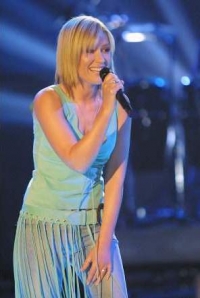
Dido Florian Cloud de Bounevialle O'Malley Armstrong (born 25 December 1971), is an English BRIT Award-winning and Grammy Award-nominated singer and songwriter.
Dido's mother, Claire (born Collins), is a French poet and her father, William O'Malley Armstrong (9 November 1938 – 22 December 2006) was an Irish publisher and former managing director of Sidgwick & Jackson.
Informally named after the mythical Carthaginian queen, Dido was educated at Thornhill Primary, City of London Girls' and Westminster School. Because she was born on Christmas Day, in childhood she celebrated, rather in the manner of the British monarch, an "official" birthday on 25 June.
After she stole a recorder from school at age five, her parents enrolled her at the Guildhall School of Music in London, England. By the time she reached her teens Dido had learned to play the piano, recorder and the violin. After her teens and whilst working as a literary agent, Dido studied law at Birkbeck, University of London, however, she never completed this course, deciding instead to take up music full-time. After learning the guitar, she showcased her skills to audiences during her 2004 Life for Rent tour.
Dido's mother, Claire (born Collins), is a French poet and her father, William O'Malley Armstrong (9 November 1938 – 22 December 2006) was an Irish publisher and former managing director of Sidgwick & Jackson.
Informally named after the mythical Carthaginian queen, Dido was educated at Thornhill Primary, City of London Girls' and Westminster School. Because she was born on Christmas Day, in childhood she celebrated, rather in the manner of the British monarch, an "official" birthday on 25 June.
After she stole a recorder from school at age five, her parents enrolled her at the Guildhall School of Music in London, England. By the time she reached her teens Dido had learned to play the piano, recorder and the violin. After her teens and whilst working as a literary agent, Dido studied law at Birkbeck, University of London, however, she never completed this course, deciding instead to take up music full-time. After learning the guitar, she showcased her skills to audiences during her 2004 Life for Rent tour.
Martha Mier

Martha Mier is an independent piano teacher and composer of piano pieces. She resides in Lake City, Florida, where she moved after graduating with honors from Florida State University. She is known for composing "Seventh Street Blues", found in her songbook Jazz, Rags & Blues Book 1. She also composed "Jackson Street Blues", which is being used in the Associated Board of the Royal Schools of Music 2007-08 syllabus as Piano Grade 5 Piece C:1. She is also renowned for her "Romantic Impressions" solo piano books, which contain pieces for beginners to advanced players alike.
Aside from her skills and duties composing and teaching, she is a member of the Music Teachers National Association, the Florida State Music Teachers Association, and the National Guild of Piano teachers, and is internationally recognised as a composer, teacher and arranger. She also takes part in many competitions in Florida as an adjudicator.
Aside from her skills and duties composing and teaching, she is a member of the Music Teachers National Association, the Florida State Music Teachers Association, and the National Guild of Piano teachers, and is internationally recognised as a composer, teacher and arranger. She also takes part in many competitions in Florida as an adjudicator.
Faye Wong

Faye Wong (王菲) (born August 8, 1969) is a Chinese singer, songwriter, actress and model. She is an icon popular in mainland China, Taiwan, Hong Kong, Singapore, Malaysia, Indonesia, Japan and to some extent in the West. She came to fame in the early 1990s while she was based in Hong Kong, returning to Beijing around 1996.
Her fan base has grown so large and devoted that media in Hong Kong, Taiwan, and mainland China often place the title tiānhòu (天后, meaning Queen of Heaven) before her name, while Japanese fans call her "Diva of Asia". An intensely private artist, she is one of the very few singers widely popular on both sides of the Taiwan Straits, despite her apparent nonchalance toward the media.
According to Guinness World Records, Faye Wong had sold 9.7 million copies of her albums as of March 2000, giving her the title of Best Selling Canto-Pop Female.
She has acted in several TV shows and films, most memorably in Wong Kar-wai's Chungking Express, a role that won her "Best Actress" award at the 1994 Stockholm International Film Festival, and in 2046. She is known to many Final Fantasy fans for her Final Fantasy VIII theme "Eyes On Me", and has also been the spokeswoman of brands such as Head & Shoulders shampoo and Pepsi-Cola. Faye Wong has also graced the covers of Vogue Taiwan, Elle and Marie Claire Hong Kong, and has had spreads in Japanese Elle and other major Asian Fashion magazines. In 2008, Wong was named "Asia's sexiest vegetarian woman" by People for the Ethical Treatment of Animals (PETA).
Her fan base has grown so large and devoted that media in Hong Kong, Taiwan, and mainland China often place the title tiānhòu (天后, meaning Queen of Heaven) before her name, while Japanese fans call her "Diva of Asia". An intensely private artist, she is one of the very few singers widely popular on both sides of the Taiwan Straits, despite her apparent nonchalance toward the media.
According to Guinness World Records, Faye Wong had sold 9.7 million copies of her albums as of March 2000, giving her the title of Best Selling Canto-Pop Female.
She has acted in several TV shows and films, most memorably in Wong Kar-wai's Chungking Express, a role that won her "Best Actress" award at the 1994 Stockholm International Film Festival, and in 2046. She is known to many Final Fantasy fans for her Final Fantasy VIII theme "Eyes On Me", and has also been the spokeswoman of brands such as Head & Shoulders shampoo and Pepsi-Cola. Faye Wong has also graced the covers of Vogue Taiwan, Elle and Marie Claire Hong Kong, and has had spreads in Japanese Elle and other major Asian Fashion magazines. In 2008, Wong was named "Asia's sexiest vegetarian woman" by People for the Ethical Treatment of Animals (PETA).
Guilherme Schroeter
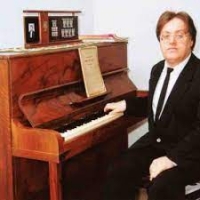
Guilherme Schroeter was born May 16, 1960 in Rio de Janeiro, Brazil, from a traditional family of Musicians: his mother, a pianist; his father, a violinist; his brother, a violinist; and his aunt, Olga Maria Schroeter, a famous opera singer.Guilherme began his studies at seven years of age with his mother in 1967. Guilherme's mother, by her devotion to music and the piano, inspired Guilherme to begin practicing the piano and also to create his first compositions. At 7, Guilherme was able to give brief performances, and four years later in 1971, at the age of 11, his first composition was performed. The composition is A Celebration for Christmas, composed for a trio of musicians.
Jo Yeong

Jo Yeong-wook is a South Korean film music supervisor. He is arguably most widely known for his collaborations with director Park Chan-wook.
Lizzie McGuire

Lizzie McGuire, a clumsy middle school girl, navigates through teenage issues while enjoying her childhood years with genuine friends, an annoying younger brother and loving parents.
Shinee

Shinee (샤이니, stylized as SHINee) is a contemporary R&B South Korean boy band. Formed by SM Entertainment in 2008, they made their debut on May 25, 2008 on SBS's Popular Songs with their promotional single, "Nunan Neomu Yeppeo (Replay)" ("누난 너무 예뻐 (Replay)", lit. "Older Sister, You're So Pretty"). The group consists of Onew, Jonghyun, Key, Minho, and Taemin.
Since their debut, Shinee has won numerous awards. They have also starred in their own reality show based on their song, "Nunan Neomu Yeppeo (Replay)". Shinee are considered to be fashion icons having started the "Shinee Trend", which is popular amongst the younger generation.
Since their debut, Shinee has won numerous awards. They have also starred in their own reality show based on their song, "Nunan Neomu Yeppeo (Replay)". Shinee are considered to be fashion icons having started the "Shinee Trend", which is popular amongst the younger generation.
Gabriel Urbain Fauré
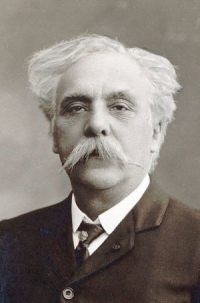
Gabriel Urbain Fauré (French: ; 12 May 1845 – 4 November 1924) was a French composer, organist, pianist and teacher. He was one of the foremost French composers of his generation, and his musical style influenced many 20th-century composers. Among his best-known works are his Pavane, Requiem, Sicilienne, nocturnes for piano and the songs "Après un rêve" and "Clair de lune". Although his best-known and most accessible compositions are generally his earlier ones, Fauré composed many of his most highly regarded works in his later years, in a more harmonically and melodically complex style.
Yiruma

Yiruma (born February 15 1978, Seoul, Korea) is a South Korean piano music composer. He is married to Son Hye-im.
Yiruma is well-known throughout the world, and his albums are sold all over Asia, as well as the United States and Europe. His most famous pieces are "Kiss the Rain", and also "River Flows in You". These pieces are widely mistaken for being associated with the movie Twilight. Although he formerly held dual citizenship as a citizen of the United Kingdom and South Korea, in July 2006 he gave up his British citizenship and entered the Republic of Korea Navy to begin his military service, which is compulsory for all male South Koreans. He has lived in Osaka, Japan for 5 years to promote album sales before giving up his dual citizenship.
Yiruma is well-known throughout the world, and his albums are sold all over Asia, as well as the United States and Europe. His most famous pieces are "Kiss the Rain", and also "River Flows in You". These pieces are widely mistaken for being associated with the movie Twilight. Although he formerly held dual citizenship as a citizen of the United Kingdom and South Korea, in July 2006 he gave up his British citizenship and entered the Republic of Korea Navy to begin his military service, which is compulsory for all male South Koreans. He has lived in Osaka, Japan for 5 years to promote album sales before giving up his dual citizenship.
The Carpenters
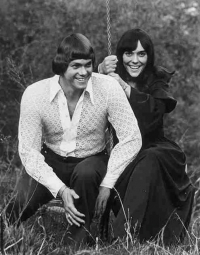
The Carpenters were a vocal and instrumental duo, consisting of siblings Karen and Richard Carpenter. Though often referred to by the public as "The Carpenters", the duo's official name on authorized recordings and press materials is simply "Carpenters", without the definite article. During a period in the 1970s when louder and wilder rock was in great demand, Richard and Karen produced a distinctively soft musical style that made them one of the best-selling music artists of all time.
The Carpenters' melodic pop charted a record-breaking score of hit recordings on the American Top 40 and Adult Contemporary charts, becoming leading sellers in the soft rock, easy listening and adult contemporary genres. The Carpenters had three #1 singles on the Billboard Hot 100 and fifteen #1 hits on the Adult Contemporary Chart (see The Carpenters discography). In addition, they had twelve top 10 singles (including their #1 hits). To date, The Carpenters' album and single sales total more than 100 million units.
During their fourteen-year career, The Carpenters recorded eleven albums, five of which contained top 10 singles (Close to You, Carpenters, A Song for You, Now & Then and Horizon), thirty-one singles, five television specials, and one short-lived television series. They toured in the United States, the United Kingdom, Japan, Australia, the Netherlands and Belgium. Their recording career ended with Karen's death on February 4, 1983. Karen passed away due to a cardiac arrest due to complications of anorexia nervosa. Extensive news coverage of the circumstances surrounding her death increased public awareness of the consequences of eating disorders.
The Carpenters' melodic pop charted a record-breaking score of hit recordings on the American Top 40 and Adult Contemporary charts, becoming leading sellers in the soft rock, easy listening and adult contemporary genres. The Carpenters had three #1 singles on the Billboard Hot 100 and fifteen #1 hits on the Adult Contemporary Chart (see The Carpenters discography). In addition, they had twelve top 10 singles (including their #1 hits). To date, The Carpenters' album and single sales total more than 100 million units.
During their fourteen-year career, The Carpenters recorded eleven albums, five of which contained top 10 singles (Close to You, Carpenters, A Song for You, Now & Then and Horizon), thirty-one singles, five television specials, and one short-lived television series. They toured in the United States, the United Kingdom, Japan, Australia, the Netherlands and Belgium. Their recording career ended with Karen's death on February 4, 1983. Karen passed away due to a cardiac arrest due to complications of anorexia nervosa. Extensive news coverage of the circumstances surrounding her death increased public awareness of the consequences of eating disorders.
Gackt

Gackt Camui (神威 楽斗 Kamui Gakuto?, born July 4, 1973), better known by his stage name Gackt, is a Japanese musician, singer, songwriter and actor. He has been active since 1993, first as the frontman of the short-lived independent band Cains:Feel, and then for the now defunct visual kei rock band Malice Mizer, before starting his solo career in 1999. He has released nine studio albums and, with forty-six singles released, holds the male soloist record for most top ten consecutive singles in Japanese music history. His single "Returner (Yami no Shūen)", released on June 20, 2007, was his first single to reach the number one spot on the Oricon charts. He became the first Japanese artist to release his music catalog on iTunes in October 2007.
Besides being established in the modern entertainment industry, his music has been used as theme songs for video games (Final Fantasy VII), anime films (Mobile Suit Zeta Gundam) and television series. In addition to his music career Gackt has acted in a few films, including a film he wrote, Moon Child, and his international debut Bunraku, and TV series such as the NHK drama Fūrin Kazan. He also performed live in theatre stage plays, one of which was written, composed and directed by him: Moon Saga - Mysteries of Yoshitsune I&II.
Besides being established in the modern entertainment industry, his music has been used as theme songs for video games (Final Fantasy VII), anime films (Mobile Suit Zeta Gundam) and television series. In addition to his music career Gackt has acted in a few films, including a film he wrote, Moon Child, and his international debut Bunraku, and TV series such as the NHK drama Fūrin Kazan. He also performed live in theatre stage plays, one of which was written, composed and directed by him: Moon Saga - Mysteries of Yoshitsune I&II.
Tomás Bretón

Tomás Bretón y Hernández (29 December 1850 – 2 December 1923) was a Spanish conductor and composer.Tomás Bretón was born in Salamanca. He completed his musical studies at the School of Fine Arts in his hometown, where he earned his living playing in small provincial orchestras, theaters and churches. At age 16, he moved to Madrid, where he played in orchestras in zarzuela theatres. He also began his studies at the Royal Conservatory under Emilio Arrieta. In 1872, Bretón received the first prize for composition at the Conservatory, together with Ruperto Chapi. After having worked in small theaters for several years, in 1882 he received a grant from the Academy of Fine Arts of San Fernando which enabled him to study in Rome, Milan, Vienna and Paris between 1881 and 1884. There, he found time to work on more ambitious works, such the oratorio El Apocalipsis and the opera Los amantes de Teruel. The premiere of this last work at the Teatro Real de Madrid cemented his name as one of the major composers of Spanish opera.
Aline Barros

Aline Barros Kistenmacker dos Santos, better known as Aline Barros is a singer, songwriter, presenter and manager in Brazil. Some of her albums have been certified multiple Diamond by the Associação Brasileira dos Produtores de Discos.
Music theory

Music theory is the study of the practices and possibilities of music. The Oxford Companion to Music describes three interrelated uses of the term "music theory"
The Color Purple
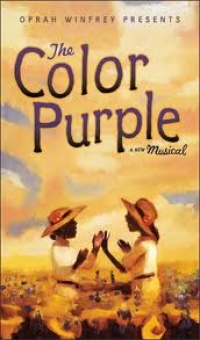
The Color Purple is a Broadway musical based upon the novel The Color Purple by Alice Walker. It features music and lyrics written by Brenda Russell, Allee Willis and Stephen Bray, with a book by Marsha Norman. It ran on Broadway in 2005 and has been touring throughout the US. The Broadway production earned eleven 2006 Tony Awards nominations.
Chris Tomlin
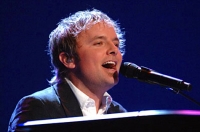
Christopher Dwayne Tomlin (born May 4, 1972) is a Christian worship leader and songwriter from Grand Saline, Texas, United States. He is a staff member at Austin Stone Community Church and is signed to EMI's sixstepsrecords. Tomlin also leads worship at many Passion events. Some of his most well-known songs are "How Great Is Our God", "Indescribable", "Forever", "Famous One", "We Fall Down", "Holy Is the Lord" and "Made to Worship".
According to the Christian Copyright Licensing International, Tomlin is the most sung Christian artist in the United States. He was awarded Male Vocalist at the 2006 and 2007 Gospel Music Awards, and was named Artist of the Year in 2007 and 2008. Chris Tomlin will be releasing his 7th studio album "Hello Love" which is due September 2nd 2008.
According to the Christian Copyright Licensing International, Tomlin is the most sung Christian artist in the United States. He was awarded Male Vocalist at the 2006 and 2007 Gospel Music Awards, and was named Artist of the Year in 2007 and 2008. Chris Tomlin will be releasing his 7th studio album "Hello Love" which is due September 2nd 2008.
Chick Corea

Armando Anthony "Chick" Corea (born June 12, 1941) is a multiple Grammy Award-winning American jazz pianist, keyboardist, drummer, and composer.
He is known for his work during the 1970s in the genre of jazz fusion. He participated in the birth of the electric fusion movement as a member of Miles Davis' band in the 1960s, and in the 1970s formed Return to Forever.
He continued to pursue other collaborations and explore various musical styles throughout the 1980s and 1990s. He is also known for promoting Scientology.
He is known for his work during the 1970s in the genre of jazz fusion. He participated in the birth of the electric fusion movement as a member of Miles Davis' band in the 1960s, and in the 1970s formed Return to Forever.
He continued to pursue other collaborations and explore various musical styles throughout the 1980s and 1990s. He is also known for promoting Scientology.
Moritz Moszkowski
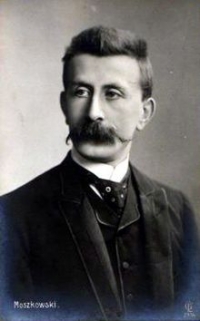
Moritz (Maurice) Moszkowski (23 August 1854 – 4 March 1925) was a German composer, pianist, and teacher of Polish descent. Ignacy Paderewski said, "After Chopin, Moszkowski best understands how to write for the piano". Although little known today, Moszkowski was well-respected and popular during the late nineteenth century.
His music is brilliant, but has also been described as "devoid of the masculine and the feminine". He wrote over two hundred small-scale piano pieces, which brought him much popularity – notably his set of Spanish Dances, Op. 12, for piano duet (later arranged for solo piano, and for orchestra ). His early Serenade, Op. 15, was world-famous and appeared in many guises, including the song Liebe, kleine Nachtigall. Today he is probably best known for his fifteen Études de Virtuosité, Op. 72, which have been performed by virtuoso pianists such as Vladimir Horowitz and Marc-André Hamelin. Surprisingly, their first complete recording was not until 1970 (by Ilana Vered). Many of his small but brilliant piano pieces, such as Étincelles (Sparks), are used as encore performances at the end of classical concerts.
He also wrote larger scale works including the Piano Concerto in E major, Op. 59 (1898), the Violin Concerto in C major, Op. 30, three orchestral suites (Opp. 39, 47, 79), and a symphonic poem Jeanne d'Arc, Op. 19.
He wrote the opera Boabdil der letzte Maurenkönig, Op. 49, on the historical theme of the capture of Granada. It was premiered at the Berlin Court Opera on 21 April 1892, and appeared in Prague and New York the following year. It did not stay in the repertoire, but its ballet music was very popular for a number of years. He wrote a three-act ballet Laurin in 1896.
His music is brilliant, but has also been described as "devoid of the masculine and the feminine". He wrote over two hundred small-scale piano pieces, which brought him much popularity – notably his set of Spanish Dances, Op. 12, for piano duet (later arranged for solo piano, and for orchestra ). His early Serenade, Op. 15, was world-famous and appeared in many guises, including the song Liebe, kleine Nachtigall. Today he is probably best known for his fifteen Études de Virtuosité, Op. 72, which have been performed by virtuoso pianists such as Vladimir Horowitz and Marc-André Hamelin. Surprisingly, their first complete recording was not until 1970 (by Ilana Vered). Many of his small but brilliant piano pieces, such as Étincelles (Sparks), are used as encore performances at the end of classical concerts.
He also wrote larger scale works including the Piano Concerto in E major, Op. 59 (1898), the Violin Concerto in C major, Op. 30, three orchestral suites (Opp. 39, 47, 79), and a symphonic poem Jeanne d'Arc, Op. 19.
He wrote the opera Boabdil der letzte Maurenkönig, Op. 49, on the historical theme of the capture of Granada. It was premiered at the Berlin Court Opera on 21 April 1892, and appeared in Prague and New York the following year. It did not stay in the repertoire, but its ballet music was very popular for a number of years. He wrote a three-act ballet Laurin in 1896.
Martin Luther
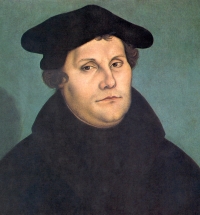
Martin Luther, O.S.A. (/ˈluːθər/; German: (About this soundlisten); 10 November 1483 – 18 February 1546) was a German professor of theology, priest, author, composer, Augustinian monk, and a seminal figure in the Reformation. Luther was ordained to the priesthood in 1507. He came to reject several teachings and practices of the Roman Catholic Church; in particular, he disputed the view on indulgences. Luther proposed an academic discussion of the practice and efficacy of indulgences in his Ninety-five Theses of 1517. His refusal to renounce all of his writings at the demand of Pope Leo X in 1520 and the Holy Roman Emperor Charles V at the Diet of Worms in 1521 resulted in his excommunication by the pope and condemnation as an outlaw by the Holy Roman Emperor.
Tom Kitt
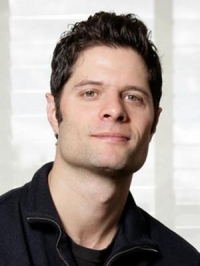
Thomas Robert "Tom" Kitt (born 1974) is an American composer, conductor, orchestrator and musician. For his score for the musical Next to Normal, he shared the 2010 Pulitzer Prize for Drama with Brian Yorkey. He also won the Tony Award and 2008 Outer Critics Circle Award, and was nominated for a Drama Desk Award for American Idiot and Everyday Rapture.
William Babell

William Babell (or Babel) (c. 1690 - 23 September 1723) was an English musician, composer and prolific arranger of vocal music for harpsichord.He received his musical training from his father, Charles Babel, a bassoonist in the Drury Lane orchestra, Johann Christoph Pepusch and possibly George Frideric Handel. He played violin in the private band of George I and appeared as a harpsichordist from 1711, often appearing with William Corbett, James Paisible and later Matthew Dubourg. He was associated with Lincoln's Inn Fields Theatre. From November 1718 until his death, he was organist at All Hallows, Bread Street, and was succeeded by John Stanley.
David Lanz
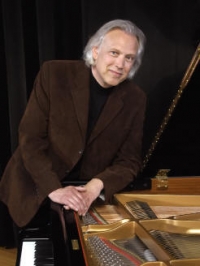
David Lanz (born June 28, 1950 in Seattle, Washington) is a Grammy-nominated New Age pianist. He has released 13 albums, each having some chart success. His most famous album, Cristofori's Dream, topped the New Age charts in 1988, which was Number One on Billboard's first adult alternative/New Age chart for 27 weeks and eventually sold platinum. Natural States peaked at place 125 on the Billboard 200.
Lanz's goal is to have his music create an atmosphere of enlightenment. In an interview with Barnes & Noble, Lanz stated that he wanted to create an atmosphere similar to that of Steven Halpern's music, but with a "more popular hook in it".
Lanz has said himself, " is the most divinely inspired instrument on the planet. It presents a great attraction to our left-right brain relationship. My goal is to create entertainment that also provides enlightenment."
Lanz's goal is to have his music create an atmosphere of enlightenment. In an interview with Barnes & Noble, Lanz stated that he wanted to create an atmosphere similar to that of Steven Halpern's music, but with a "more popular hook in it".
Lanz has said himself, " is the most divinely inspired instrument on the planet. It presents a great attraction to our left-right brain relationship. My goal is to create entertainment that also provides enlightenment."
 Sheet Music 365 is a site for those who wants to access popular sheet music easily,
letting them download the sheet music for free for trial purposes.
It's completely free to download and try the listed sheet music, but you have to delete the files after 24 hours of trial.
Don't forget, if you like the piece of music you have just learned playing,
treat the artist with respect, and go buy the original sheet music.
Sheet Music 365 is a site for those who wants to access popular sheet music easily,
letting them download the sheet music for free for trial purposes.
It's completely free to download and try the listed sheet music, but you have to delete the files after 24 hours of trial.
Don't forget, if you like the piece of music you have just learned playing,
treat the artist with respect, and go buy the original sheet music.
